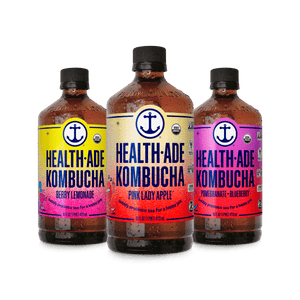
Kombucha | 12 Pack
Fan Favorite Variety Pack
One-time Purchase
49.95

Copied URL to clipboard!
Let’s talk about the microbiome and how it helps you digest.
You already know that your digestive system breaks down the food you eat. But did you know it’s your microbiome that does almost half of the work!? Needless to say, from the mouth to the colon, your microbiome is busy!
Whether you’re experiencing digestive issues, mood swings, low energy, or simply feeling off — the gut’s got a lot to do with it. Without a doubt, maintaining a diverse community of microbes in your gut is ESSENTIAL to health & happiness. In fact, guts with a high abundance of bacteria are linked to reduced rates and improved outcomes in cancer, weight gain and obesity, diabetes, heart disease, high cholesterol, and digestive diseases. Now that we’ve scratched the surface on all the incredible benefits that come from maintaining a healthy gut, let’s break down the process.
Your microbiome + digestion: it starts in the mouth!
While most of your microbiome lives in your colon, about 250-700 different species of microbes live in your mouth. These bacteria get started breaking down food as soon as you put it in your mouth. Not only do they digest our food, but a balanced microbial profile in your mouth prevents tooth decay, gum disease, cavities, AND bad breath.
💭 FUN FACT: The microbes in your mouth break down the nitrate in fruits and veggies, and as a biproduct, produce nitric oxide. Nitric oxide is how you regulate your blood pressure, obviously an important bodily function.
Given a healthy microbiome in the mouth is so important, it’s worth mentioning to keep an eye on our use of antiseptics. While most toothpastes no longer use antiseptics, they can still be found in many over-the-counter mouthwashes (look out for ingredients like “chlorhexidine”). While we used to think keeping our mouth “clean” was the goal, recent studies are showing that using antiseptic mouthwash can actually hurt us (and raise our blood pressure!) We now know that an abundant and diverse microbiome is key to health in the mouth — the good microbes keep the bad microbes “in check,” and that balance keeps disease at bay.
Your microbiome + digestion: inside the intestines
It might begin in the mouth, but most of the microbiome’s work happens in the colon. Just like your body breaks down food to mine nutrients (like carbohydrates or vitamin C), the microbes in your gut break down anything you can’t digest and in turn create compounds you can’t live without. These compounds, called post-biotics, work locally in the gut AND systemically through your blood stream on almost every aspect of your health: they are proven drivers of mood, energy, metabolism, sleep, immunity, and inflammation. In many cases, the post-biotics produced are short-chain fatty acids like Butyrate, lactic acid, and acetic acid, which have been extensively linked to positive health outcomes.
On top of breaking down things we can’t digest, the microbiome also has the power to produce compounds we can’t. For example, humans, plants, and animals cannot make vitamin B12, yet it’s necessary for blood cell and DNA formation, as well as brain and nerve development. Only the bacteria in our intestines have the required enzyme to extract B12 out of food.
Finally, the microbes can break down things we DON’T want in our system, like toxins. A healthy microbiome has demonstrated it can break down more than 30 environmental contaminants in our intestine (like pesticides), never allowing these compounds to enter our blood stream.
How do I know if my microbiome is “good:”
Now that you know all the ways a healthy gut contributes to effective digestion — how do you know if your gut’s in tip-top shape? One word: poop.
It’s not pretty, but the frequency of your bowels, how they exit the body, and how they look are collectively the best way to know if things are “as they should be” in your microbiome.
You should be pooping:
Some things to try if your microbiome is “off”:
Putting it all together:
The microbes have a very big job when it comes to digestion: they break down food you can’t and turn it into hero compounds (post-biotics), they destroy toxins, AND they make nutrients you can’t live without. When something isn’t right, it shows up in your poop. Thankfully, there are a number of things you can try to get it right. As a nutritionist, I personally think one of the most impactful changes you can make is to eat more fiber AND more fermented foods – it’s easy to get, tasty to eat, and makes a HUGE difference on your gut health.